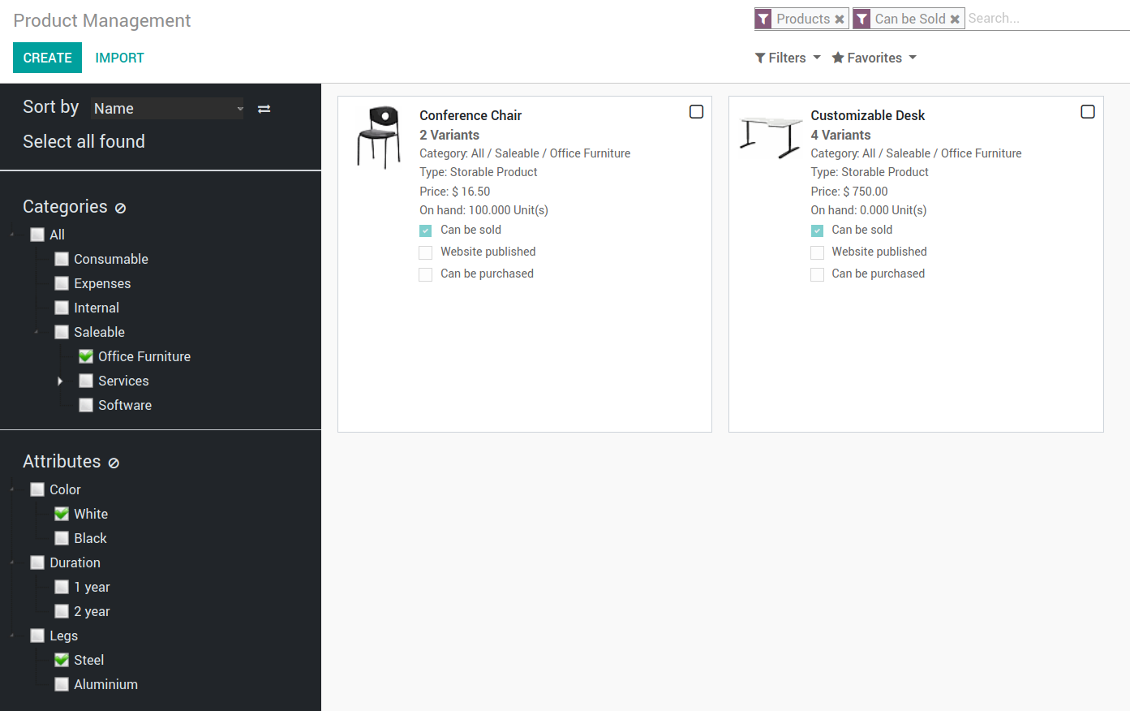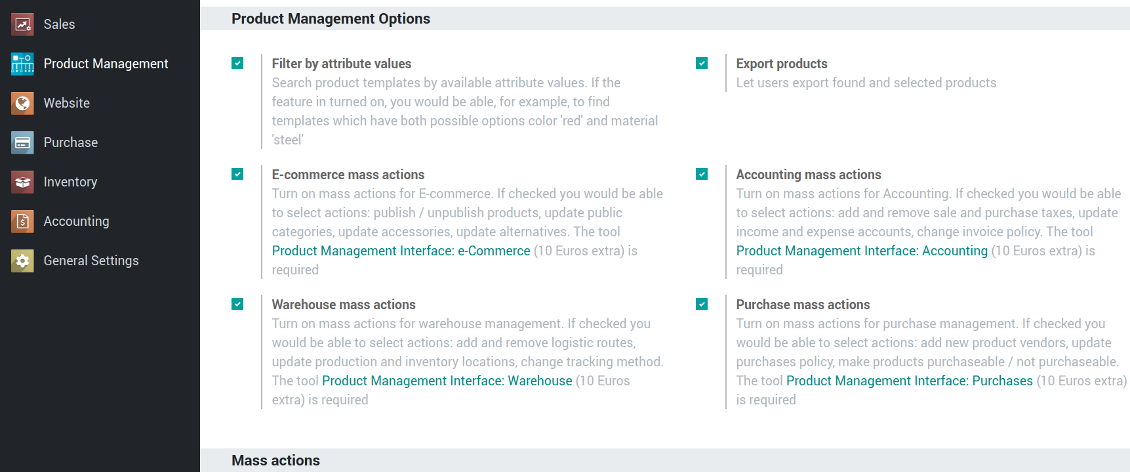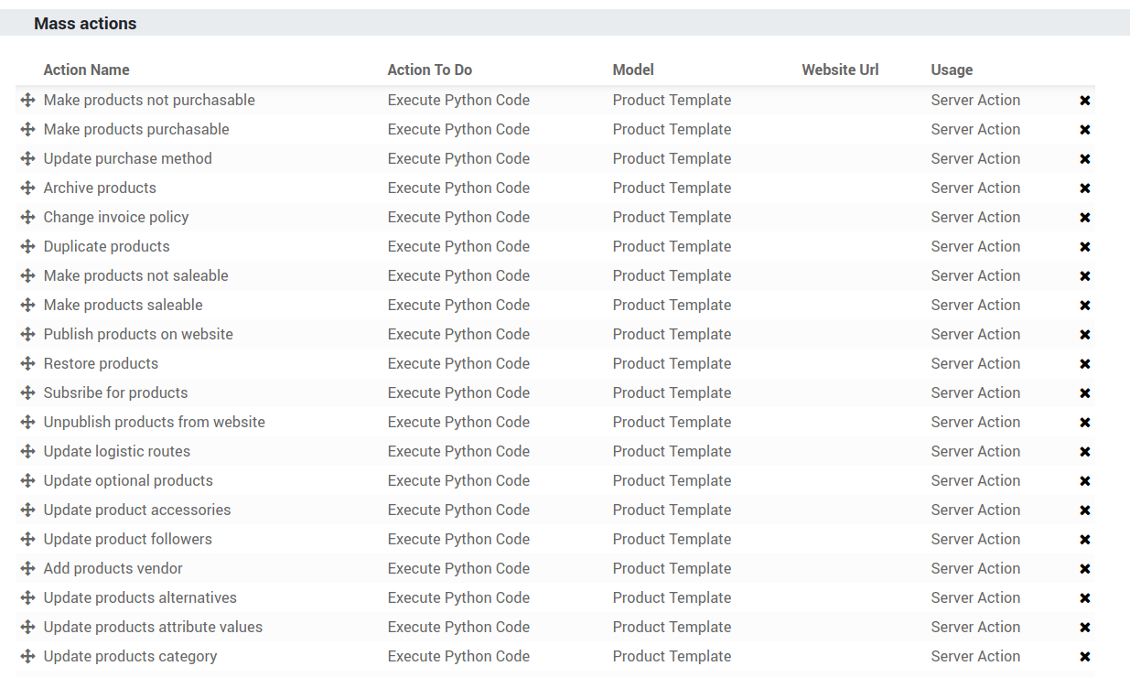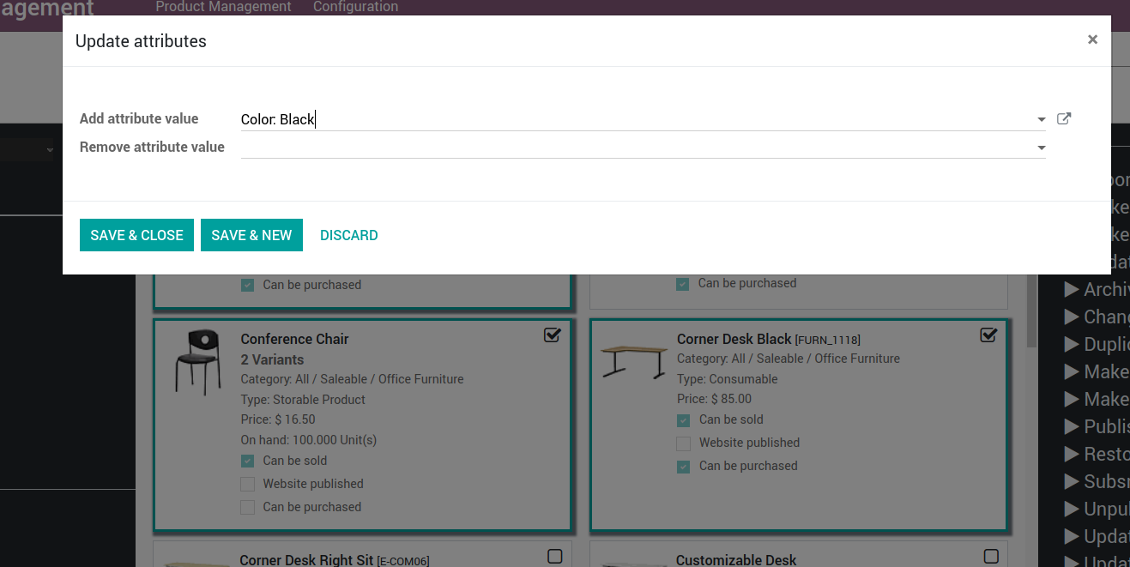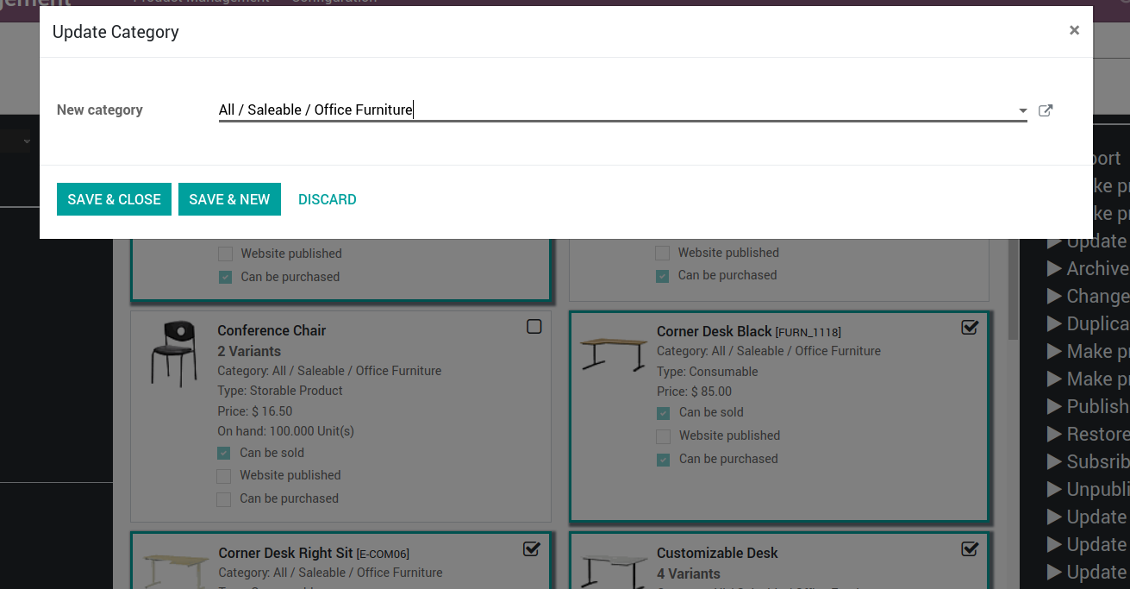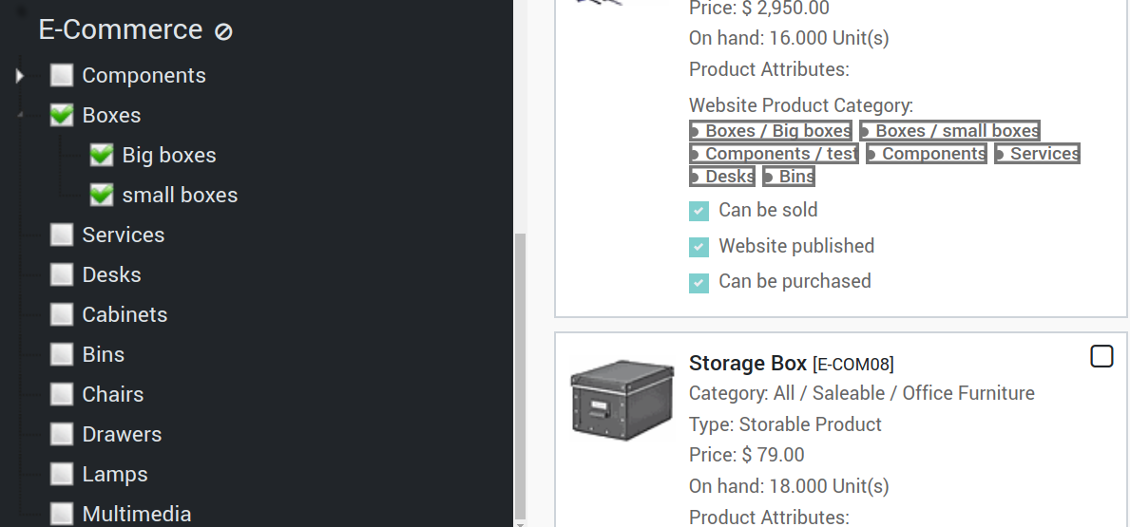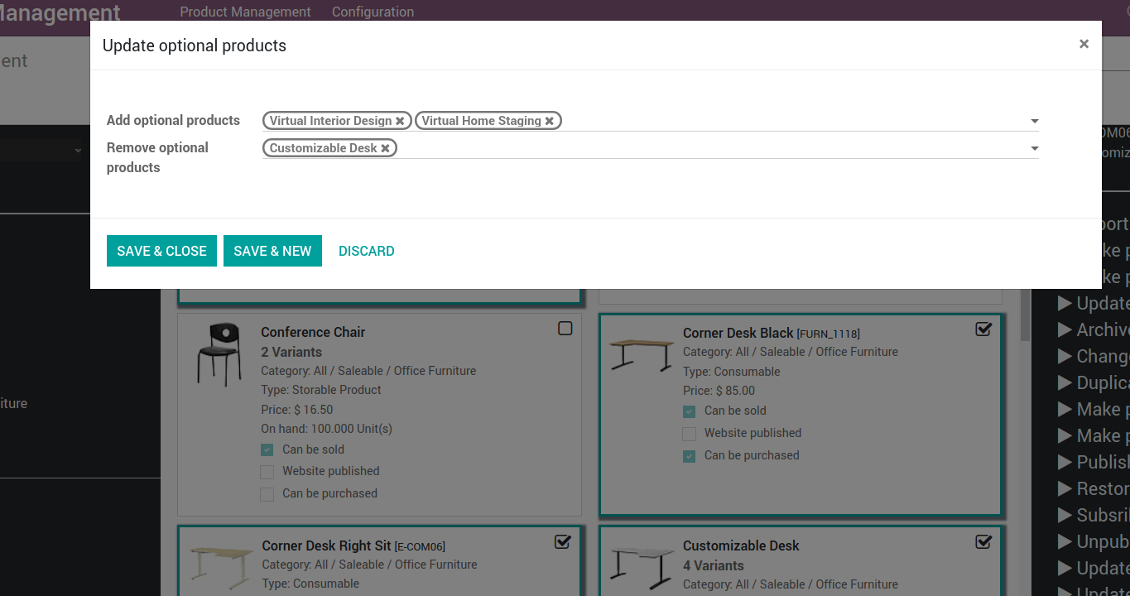Product Management Interface v.11
The tool to search, select and mass update product templates
- Product Management Interface - the core app. It might be used stand-alone as a system to find, pick up, and update basic product fields. The price is 92 Euro
- Product Management Interface: e-Commerce - the optional module, which introduces mass products actions to change E-shop related attributes. The features assumed by this add-on are marked by the icon . The price is 10 Euro
- Product Management Interface: Warehouse - the optional module to update in batch warehouse characteristics of product templates. The features assumed by this add-on are marked by the icon . The price is 10 Euro
- Product Management Interface: Accounting - the optional module to manage accounting traits of products in bulk. The features assumed by this add-on are marked by the icon . The price is 10 Euro
- Product Management Interface: Purchases - the optional module offering mass actions on purchase columns of products. The features assumed by this add-on are marked by the icon . The price is 10 Euro
Structure products by categories just through ticking check boxes. The tool let you select one or multiple ones, choose only parent category or all children recursively
Systematize product templates by available attributes values. Now it is not a trouble to select all templates which might be both white and metal
New Navigate by E-commerce categories to search products from E-shop perspective
Apply standard product filters using Odoo regular search to narrow results
Choose an unlimited number of products step by step. A current selection is not spoilt with a new search or when you opened a record. You may also select all products found by you criteria (not only ones displayed on a current page)
Configure the list of mass actions through selecting among multiple ones offered by the tool. Look for the whole list at the section Mass Actions List
Execute any of chosen multiple mass actions and observe results in real-time. New you might define by your own which product fields should be shown on a kanban card in addition to standard columns
The interface is available for any user which has rights for products (e.g. sales, warehouse or purchase manager) and who has the group 'Product manager' assigned. Configuration might be done only by the group Administration / Settings
The tool supports multiple click events. To open a product form - click on a image area, to select an item for mass update – click on any other area of this Kanban card
Mass Actions List
- Archive products in bulk
- Restore selected products which have been previously archived
- Change product category of all selected items
- Add / remove an attribute value to all found templates
- Export chosen items (the setting 'Export products' should be turned on)
- Mass edit product type (consumable, service, storable)
- Publish or unpublish products in batch
- Update products to be saleable / not saleable
- Update products to be purchasable / not purchasable
- Add / remove public E-shop categories of selected templates
- Add / remove products' alternatives
- Add / remove products' accessories
- Assign a new vendor to product templates in bulk and make this supplier the most prioritized
- Add / remove logistic routes
- Modify invoice policy ('Ordered quantities', 'Delivered quantities')
- Duplicate a few product templates simultaneously
- Add / remove customer taxes
- Add / remove vendor taxes
- Subscribe to / unsubscribe from products' discussions
- Add / remove templates' followers
- Update purchase method ('On ordered quantities', 'On received quantities')
- Update tracking method
- Change price difference account
- Change income account of products
- Change expense account of templates
- Change inventory location
- Change production location
Beside the list above you can also prepare your own mass actions. Look at the configuration tab.
Mass actions
- As the model always use 'Product Template'. Otherwise you action would not be displayed in the list of operations
- In case you want to return a wizard, such a wizard should not have a footer (only standard buttons) and should have an explicitly specified view_id. Look for examples in any module of the Product Management Bundle
Example of custom mass action
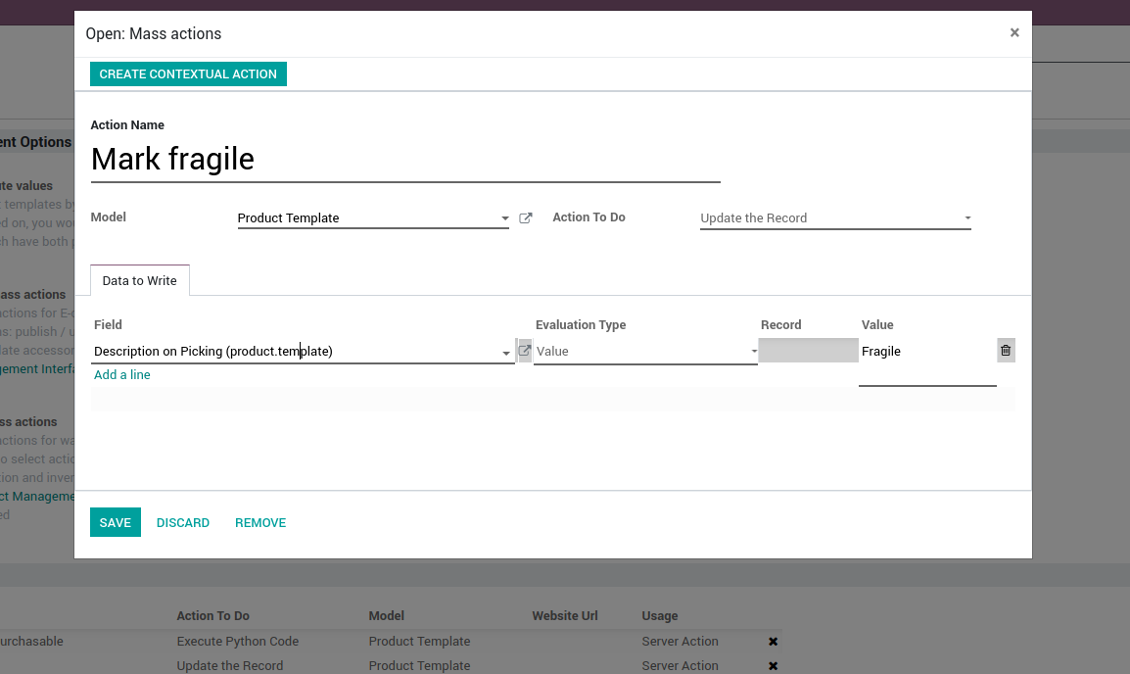
Installation Tips
Bug reporting
If you encounter bugs or inconsistent behavior, do not hesitate to contact us. We guarantee to provide fixes within 60 days of purchase and are intensely interested in improving our tools even after this period.
You do not need a phone number or credit card to contact us. You should only pass a short email sign-up, which does not take more than 30 seconds.
Please include as many details as possible in your request: screenshots, Odoo server logs, a full description of how to reproduce your problem, and so on. Usually, it takes a few business days to prepare a working plan for an issue (if a bug is confirmed) or provide you with guidelines on what should be done (otherwise).
Public features requests and module ideas (free development)
We are strongly motivated to improve our tools and would be grateful for any feedback. If your requirements are of public use and might be efficiently implemented, the team will include those in our to-do list.
Such a to-do list is processed regularly and does not assume extra fees. Although we cannot promise deadlines and final design, it might be a good way to get desired features without investments and risks.
You do not need a phone number or credit card to contact us. You should only pass a short email sign-up, which does not take more than 30 seconds.
The technical core to synchronize your cloud storage solution with Odoo
398€The tool to build deep and structured knowledge base for internal and external use. Knowledge System. KMS
The tool for time-based service management from booking appointments to sales and reviews
398€The tool to set up KPI targets and control their fulfillment by periods. KPI dashboards. Dashboard designer. KPI charts
198€The tool to automatically synchronize Odoo attachments with OneDrive files in both ways
487€The tool to automatically synchronize Odoo attachments with Google Drive files in both ways
487€The tool to configure variant prices based on attributes coefficients and surpluses
88€The tool to administrate vendor data about products, prices and available stocks
98€
